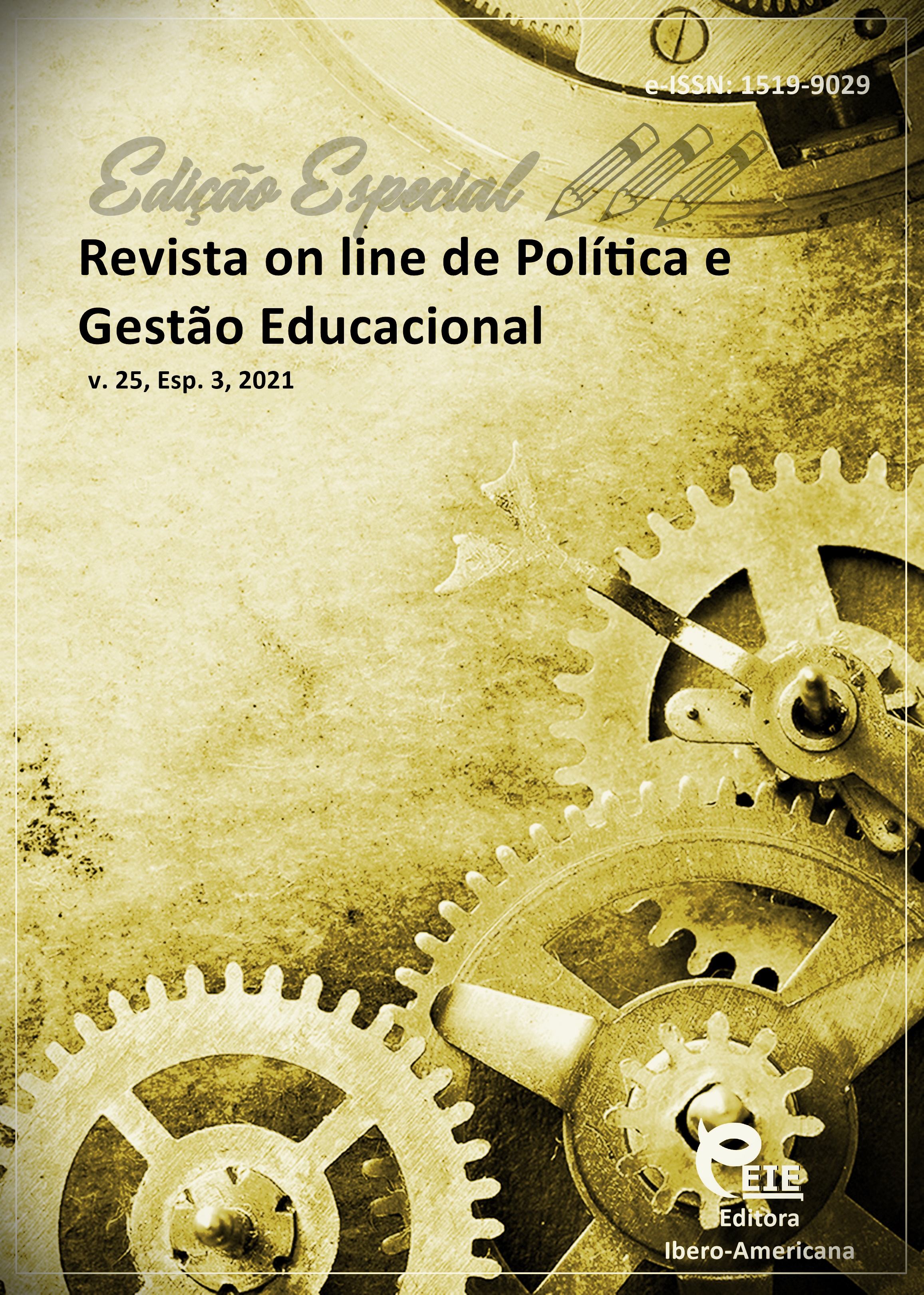Program for improving autonomy and scientific research in remote education
DOI:
https://doi.org/10.22633/rpge.v25iesp.3.15286Keywords:
Autonomy, Science, Distance education, Research and programAbstract
Students in Regular Basic Education have shown some difficulties in developing autonomy during their learning sessions; however, this situation increased when remote education was implemented, due to mandatory confinement, caused by the emergence of Covid 19, an alternative had to be sought, which allowed solutions to this situation to be provided. It was formulated as a study objective was to implement a Program improving autonomy and scientific research in remote education. The method used was a quantitative approach, with experimental design, a population of 84 students from the I.E. Celso Lino Ricaldi was used, a program was applied in ten sessions, resulting after its implementation, in the post test that 35.71% of the control group and 67.86% of the experimental group are at the level achieved. This data led to the conclusion that the programme implemented has positive effects on the autonomous learning and scientific research of the chosen educational institution.
Downloads
References
ALMODÓVAR-LÓPEZ, M. et al. La enseñanza remota no viene sin retos. Revista Electrónica Educare, v. 24, n. supl., p. 1-4, 2020. DOI: doi.org/10.15359/ree.24-s.15
BEDOYA, L. et al. La autonomía en la primera infancia desde el trabajo por proyectos. 2013. 106 f. Thesis (Doctorate) – Facultad de Educaciòn, Universidad Pontificia Bolivariana, Medellìn, 2013. Available: https://repository.upb. edu.co/handle/20.500.11912/1122. Access: 10 June 2020.
CANABAL, C.; MARGALEF, L. La retroalimentación: la clave para una evaluación orientada al aprendizaje. Profesorado, Granada (Spain), v. 21, n. 2, p. 150-170, 2017. Available: https://recyt.fecyt.es/index.php/profesorado/article/view/59454. Access: 10 June 2020.
CARRASCO, S. Metodologí de la investigación científica. Lima, Peru: Editorial San Marcos, 2019.
CRISOL-MOYA, E.; HERRERA-NIEVES, L.; MONTES-SOLDADO, R. Virtual education for all: Systematic review. Education in the Knowledge Society, v. 21, p. 1-13, 2020. DOI: doi.org/10.14201/eks.20327
DÍAZ-BARRIGA-ARCEO, F.; BARRÓN-TIRADO, M. C. Currículo y pandemia: Tiempo de crisis y oportunidad de disrupción. Revista Electrónica Educare, v. 24, n. supl., p. 1-5, 2020. DOI: doi.org/10.15359/ree.24-s.3
FLÓREZ-NISPERUZA, E.; DE LA OSSA ALBIS, A. La indagación científica y la transmisión-recepción: una contrastación de modelos de enseñanza para el aprendizaje del concepto densidad. Revista Científica, v. 31, n. 1, p. 55-67, 2018. DOI: doi.org/10.14483/23448350.12452
GARCÍA-RUIZ, R.; PÉREZ-ESCODA, A. Communication and education in a digital connected world. Presentation. Icono14, v. 18, n. 2, p. 1-15, 2020. DOI: doi.org/10.7195/RI14.V18I2.1580
GONZÁLEZ, T. et al. Influence of COVID-19 confinement on students’ performance in higher education. PLoS ONE, v. 15, n. 10, e0239490, 2020. DOI: doi.org/10.1371/journal.pone.0239490
GUTIÉRREZ, M. et al. Autonomy support, psychological needs satisfaction, school engagement and academic success: A mediation model. Universitas Psychologica, v. 17, n. 5, 2018. DOI: doi.org/10.11144/Javeriana.upsy17-5.aspn
LOBATO FRAILE, C. El estudio y trabajo autónomo del estudiante. In: DE MIGUEL, M. (Dir.). Métodos y modalidades de enseñanza centradas en el desarrollo de competencias. Madrid, Spain: Alianza Universidad, 2006. Available: https://www.uaem.mx/sites/default/files/facultad-de-medicina/descargas/aprendizaje-autodirigido.pdf. Access: 10 June 2020.
LÓPEZ, M. et al. La enseñanza remota no viene sin retos. Revista Electrónica Educare, v. 24, n. supl., p. 1-4, 2020. DOI: doi.org/10.15359/ree.24-s.15
MALDONADO-SÁNCHEZ, M. et al. Estrategias de aprendizaje para el desarrollo de la autonomía de los estudiantes de secundaria. Propósitos y Representaciones, v. 7, n. 2, p. 415-427, 2019. DOI: doi.org/10.20511/pyr2019.v7n2.290
MEDINA, D.; NAGAMINE, M. Estrategias de aprendizaje autónomo en la comprensión lectora de estudiantes de secundaria. Propós. represent., v. 7, n. 2, p. 134-146, 2019. ISSN 2307-7999. DOI: dx.doi.org/10.20511/pyr2019.v7n2.276
MORENO, R.; MARTÍNEZ, R. Aprendizaje autónomo. Desarrollo de una definición. Revista Latina de Análisis de Comportamiento, v. 15, n. 1, 2007, p. 51- 62, 2007. Universidad Veracruzana Veracruz, México. Available: https://www.redalyc.org/pdf/2745/274520891004.pdf. Access: 10 June 2020.
PÉREZ DE CABRERA, L. El rol del docente en el aprendizaje autónomo: la perspectiva del estudiante y la relación con su rendimiento académico. Rev. Diálogos, n. 11, p. 45-62, 2013. Available: https://core.ac.uk/downl oad/pdf/47265063.pdf. Access: 10 June 2020.
PERU. Currículo Nacional de la Educación Básica - CNEB. Lima, Peru: Ministerio de Educación, 2016. Available: www.minedu.gob.pe. Access: 10 June 2020.
QUISPE, J. Los recursos tecnológicos y su relación con el aprendizaje autónomo de los estudiantes de la escuela profesional de contabilidad, de la Universidad Católica los Ángeles de Chimbote, distrito Juliaca, año 2018. 2018. 111 f. Dissertation (Master's Degree in Education) – Universidad Católica los Angeles de Chimbote, Chimbote, Peru, 2018. Available: http://repositorio.uladech.edu.pe/handle/123456789/7528. Access: 10 June 2020.
RAYNAUDO, G.; PERALTA, O. Conceptual change: a glance from the theories of Piaget and Vygotsky. Liberabit: Revista Peruana de Psicología, v. 23, n. 1, p. 137-148, 2017. DOI: doi.org/10.24265/liberabit.2017.v23n1.10
SIANES, A.; SÁNCHEZ, E. E-learning en 15 días. Retos y renovaciones en la Educación Primaria y Secundaria de la República de Croacia durante la crisis del COVID-19. How has we Introduced distance Learning? Revista Española de Educación Comparada, v. 36, 2020.
SOUSAI, V. An overview of research designs relevant to nursing: Part 1: Quantitative research designs. Rev. Latino-Am. Enfermagem, v. 15, n. 3, 2007. DOI: doi.org/10.1590/S0104-11692007000300022
UZCÁTEGUI, Y.; BETANCURT, C. La metodología indagatoria en la enseñanza de las ciencias: una revisión de su creciente implementación a nivel de Educación Básica y Media. Revista de Investigación, v. 37, n. 78, 2013. Available: http://ve.scielo.org/scielo.php?script=sci_arttext&pid=S1010-29142013000100006. Access: 10 June 2020.
Published
How to Cite
Issue
Section
License
Copyright (c) 2021 Revista on line de Política e Gestão Educacional

This work is licensed under a Creative Commons Attribution-NonCommercial-ShareAlike 4.0 International License.
Manuscritos aceitos e publicados são de propriedade da Revista on line de Política e Gestão Educacional. É vedada a submissão integral ou parcial do manuscrito a qualquer outro periódico. A responsabilidade do conteúdo dos artigos é exclusiva dos autores. É vedada a tradução para outro idioma sem a autorização escrita do Editor ouvida a Comissão Editorial Científica.










